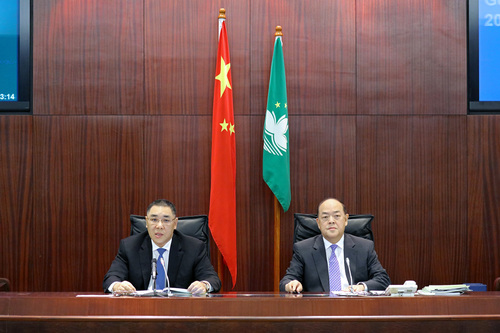 Chief Executive, Mr Chui Sai On, delivers the Policy Address for the Fiscal Year 2016 at the Legislative Assembly.
Chief Executive, Mr Chui Sai On, delivers the Policy Address for the Fiscal Year 2016 at the Legislative Assembly.
The Government would give great weight to all projects relating to the enhancement of local residents’ livelihoods and push forward policies for the adequate diversification of the economy, said the Chief Executive, Mr Chui Sai On, today. Mr Chui made the remarks during his annual Policy Address session at the Legislative Assembly this afternoon. The Policy Address for the Fiscal Year 2016 was entitled “Focusing on livelihoods, boosting the economy and ensuring stable development”. Enhancing local people’s livelihoods is at the centre of policy, and that would continue in the policy programme for the coming year, by observing the principles of “putting the people first” and “scientific decision-making”, Mr Chui said. The Government is dedicated to: pressing ahead with projects relating to livelihood and welfare; to improving mechanisms on social security; to stepping up efforts to address local people’s housing needs; to enhancing healthcare service quality; and to upgrading the quality of education in an effort to cultivate even greater numbers of talented local residents. Welfare is one of the most important elements in establishing a long-term mechanism for improving livelihoods, and is a pragmatic way of sharing the fruits of economic development, Mr Chui said. The Government would use short- and medium-term measures to ensure: construction of such a welfare mechanism; that sources for such welfare are used appropriately; and that projects relating to the improvement of local people’s livelihoods are optimised, he added. Mr Chui said the Government would continue implementing the Welfare Partaking Scheme. Under the current arrangements, each permanent resident receives 9,000 patacas and each non-permanent resident gets 5,400 patacas. The Government would inject 10,000 patacas of seed capital into the Central Provident Fund savings account of every eligible resident. In 2016 the Government would inject an additional 7,000 patacas from the fiscal surplus into those eligible accounts, he added. Mr Chui said that in the coming year the Government proposed to increase public subsidies on a number of relief measures. The minimum subsistence index would be raised to 4,050 patacas; the Government-disbursed elderly pension to 3,350 patacas per month, and the old age allowance to 8,000 patacas per year. Mr Chui announced there would be an extra allowance, equivalent to one month’s-worth of financial assistance, to eligible families for certain relief measures. Relief measures such as the special living allowance, special subsidy to disadvantaged families, the short-term food assistance programme, disability gratuity and health voucher programme would be continued in the coming year. For eligible students, the Government would increase allowances for meals and textbooks. The Continuing Education Programme, which offers study allowances for Macao residents enrolled in a tertiary education programme or training programme, will continue supporting the development of local talent. For employed residents, the first 30 percent of annual income from employment will continue to be tax free, up to a ceiling of 144,000 patacas. There would be also a 60 percent rebate on the personal income tax paid by each tax-paying Macao resident. That would be subject to a ceiling of 12,000 patacas and rebates to be received in 2017, he said. The Government would continue to subsidise low-income full-time employees with up to 5,000 patacas per month. For residents that are first-time homebuyers, the Government would waive real estate stamp duty for the first three million patacas of a home’s value. The Chief Executive said the Government would expedite the establishment of a comprehensive social security mechanism, which includes a social security fund, social aid and welfare payments. The Government would foster the building of a long-term mechanism on social security that was based on a multi-pronged and multi-dimensional model. To realise this goal, Mr Chui said the Government would inject 37 billion patacas into the Social Security Fund in order to maintain its sustainability. It would also strengthen its efforts in promoting a two-tier social security system. He said the Government would act in line with the 10-year (2016 to 2025) Action Plan for Elderly Services and would set up an interdepartmental committee on a mechanism for protective services for the elderly. Regarding housing policy, Mr Chui stressed the Government would rationally allocate public resources and press ahead with public housing construction projects. He announced the Government would initiate an overall plan for urban planning in order to monitor closely the manner of the city’s development. Next year, the Government would form an urban renewal committee to conduct related research and push forward redevelopment in old districts. Undeveloped land – plots previously classified as “idle” and that might revert to the Government – would be identified as priority sites for building public housing, said Mr Chui. The Government would foster allocation of public housing and strengthen management of such housing resources and would introduce effective measures to maintain a healthy development of the housing market. Regarding healthcare, Mr Chui said the Government attached great importance to improving local people’s health. To realise that aim, Mr Chui suggested special health care services for the elderly should be introduced at health centres and that traditional medicine should be provided at primary healthcare services venues. The Government would also strengthen cooperation with non-governmental organisations in order to broaden healthcare services provided to local residents. The Government would launch a mechanism encouraging continuous learning by healthcare specialists, and also optimise ways of protecting frontline medical personnel. The Government has been actively promoting the inclusion of traditional medicine in its primary healthcare system, since the establishment in Macau in August this year of the World Health Organization Collaborating Centre for Traditional Medicine. The Government supports via its education policies the visions of “letting Macao thrive through education” and “building Macao with talented individuals”. In the coming year, the Government would continue to optimise education-related regulation and planning in order further to improve Macao’s economic competitiveness and the overall qualification of the residents. The Government would also: complete an interim review for the 10-year Plan for Non-tertiary Education; commence research on what level of demand for qualified professionals would exist in Macao in the coming three to six years; train sufficient people to meet that demand so improving upward mobility of local residents; and introduce policies to attract back to the city talented Macao people that are currently living overseas. The Full Policy Address for the Fiscal Year 2016 and pamphlets in Chinese and Portuguese summarising it will be available at the following locations: the Government Head Office Auxiliary Bureau; the Government Information Bureau; the Government Printing Bureau; the Public Information Centre; the headquarters of the Civic and Municipal Affairs Bureau; the Macao Central Library; and at the Macao Post. The materials are also available for download on the websites of these public bodies.
Video:【GCS】Chief ExecuitvePlease go to GCS YOUTUBE Channel for more video clips: http://youtube.com/macaogcs


